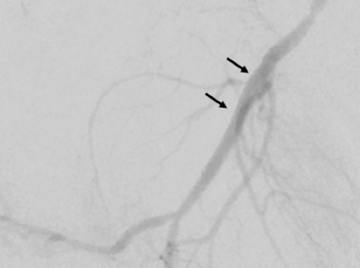Recent study: Success rate of stent implantation for erectile dysfunction at 67 percent
Most people know the term stent in the context of heart diseases. What is little known, however, is that stents are becoming more and more established in the therapy of erectile dysfunction. If the patients are eligible for the intervention, stent implantation now eliminates atherosclerotic induced erectile dysfunction in more than two thirds of all patients.
Erectile dysfunction often results from circulatory disorders (more on that: causes for erectile dysfunction). So, it’s all the more obvious to restore the blood flow of the penis in order to treat erectile dysfunction. Medical practitioners speak of revascularization of the penis arteries by means of balloon-tipped catheter. To put it simply: ´The arteries supplying the penis are dilated and stabilized. That sounds more complicated than it is.
Stent implantation is suitable for all men whose erectile dysfunction results from insufficient blood supply due to arterial obstruction in the pelvic and penis arteries. An individually applicable assessment can only be made after a precise diagnosis of erectile dysfunction. If, for example, the diagnosis shows that the penis arteries are not yet excessively damaged, shock wave therapy for erectile dysfunction may be the better choice for many men.
The success rate of stent implantation for erectile dysfunction is very good. In a recent study (February 2019) headed by Prof. Diehm the intervention was technically successful in 97.6 percent. In 49 out of 50 men of this study, the obstructions of the arteries leading to the penis could be successfully eliminated. As a result, in two thirds of men (67 percent) the erectility improved. Even one year after the intervention more than half of the test persons (57 percent) were still able to penetrate. And 60 percent of all patients were able to maintain the erection during sexual intercourse.
The results of the study in detail: Endovascular Therapy for Erectile Dysfunction—Who Benefits Most? (PDF, English)
Prof. Nicolas Diehm and his colleagues assess the result as encouraging. This is all the more true as no risk patients had been excluded from the study. On the contrary, men with whom the erectility was impaired due to other problems had also been taken into account. Such risk factors are for example great age, pronounced hypertension or diabetes.
Another advantage of stent implantation is that complications in the revascularization of the penis arteries are very rare according to Prof Diehm. In the recent study none of the participants had undesirable side effects. However, just the same as with stents in other blood vessels, an arterial reobstruction can occur. This risk is the greater, the stronger the vessel has already been damaged. Therefore, it is of great importance to detect circulatory disorders as early as possible in order to initiate a promising treatment in time.
The stent implantation of the penis arteries is not a surgery but a minimal-invasive intervention. Under local anesthesia a small incision is made in the groin. Via this access, a catheter is guided over the pelvic artery to the penis arteries. Via the catheter, the obstructed artery is dilated with a balloon. Subsequently, a stent is implanted to stabilize the constriction.

01. Between the two arrows, a strong obstruction (stenosis) of the left penis artery (arteria pudenda interna) can be detected. This is the reason why the penis is not sufficiently supplied with blood.

02. This picture shows the same artery while it is dilated with a balloon. Medical practitioners refer to this method as balloon dilatation or balloon angioplasty.

03. After the dilatation by the balloon, the dilated artery can again collapse a bit. Hence, it remains a stenosis. The next step is to stabilize this so-called residual stenosis with a stent.

04. After the successful stent implantation the obstruction is eradicated. In order to avoid a restenosis as best as possible, the stent is coated with medication.
The founders of the institute for erectile dysfunction, Prof. Dr.med. Nicolas Diehm, PD Dr. med. Hak Hong Keo and Dr. med. Christian Regli as well as their partner Dr. med. Martin Christian Schumacher (urologist) are internationally recognized pioneers in the angioplasty treatment of erectile problems. For more information about their scientific work and further literature see News.
After well over four hundred interventions, Prof. Diehm describes the stent implantation for erectile dysfunction as a routine intervention. Currently, he carries out this intervention up to 20 times per month.

Dr. med. Christian Regli, Prof. Dr. med. Nicolas Diehm and PD Dr. med. Hak Hong Keo
Scientific works and further literature
Nicolas Diehm, Stefanie Marggi, Yasushi Ueki, Dagmar Schumacher, Hak Hong Keo, Christian Regli, Dai Do Do, Tilmann Moeltgen, Philipp Grimsehl, Stephen Wyler, Heinz Schoenhofen, Lorenz Räber, and Martin Schumacher: Endovascular Therapy for Erectile Dysfunction—Who Benefits Most? (Journal of Endovascular Therapy, 2019)
Nicolas Diehm, Hak Hong Keo, Anne-Katrin Born, Stephen Wyler: Interdisciplinary options for diagnosis and treatment of organic erectile dysfunction, Swiss Medical Weekly 2015
Nicolas Diehm, F. Baumann: Erektile Dysfunktion: Technische Fortschritte ermöglichen endovaskuläre Therapie, Cardiovasc 2013
Would you like more detailed information in advance? Watch the following video. Dr. Diehm gives an overview of causes and treatment of erectile dysfunction (German).
At the Institute for Erectile Dysfunction you find qualified dialog partners for all questions on erectile dysfunction. If you have any questions or would like to make a consultation appointment: Call us: +41 62 824 02 42 or write an e-mail to info@erectiledysfunction-treatment.com
Monday through Friday:
8.00 a.m. to 11.30 a.m. and 1.30 to 5.30 p.m.
Further office hours are provided by our experts at the Hirslanden Clinic Aarau, the Hospital Zofingen, the Medical Center Täfernhof and the Vascular Institute Baden and Zofingen.
Institute for Erectile Dysfunction
c/o Vascular Institute Central Switzerland
Aarenaustrasse 2 b
CH-5000 Aarau
Phone: +41 62 824 02 42
Fax: +41 62 824 02 27
info@erectiledysfunction-treatment.com